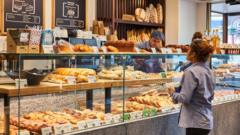Article Text:
In the renowned Burgundy region of France, famous for its high-quality wines, winemakers are increasingly anxious about the implications of Donald Trump's tariffs on their most significant export market, the United States. This beautiful and prestigious area is home to acclaimed vineyards that produce exquisite wines, but the threat of escalating import duties is putting immense pressure on local vintners.
As vineyard worker Élodie Bonet carefully trims vine shoots under a drizzly spring sky, she focuses on ensuring the plants direct their energy toward producing worthwhile grapes. Meanwhile, at her vineyard in Morey-Saint-Denis, winemaker Cécile Tremblay shows the distinctive qualities of her wines while expressing concern over the tariffs. "The U.S. represents about 10% of my production. That's a considerable volume for me!" she states, acknowledging the latest tariffs imposed by Trump.
Beginning with a 200% mark-up threat on European alcohol and settling on a 10% tariff for now, President Trump has indicated that this could rise dramatically to 20% in July, impacting the pricing of European imports. Though Tremblay is cautious about voicing her concerns publicly, fear hangs over the industry, with many winemakers opting for silence as tensions build.
François Labet, president of the Burgundy Wine Board, highlights the significance of the U.S. market to the region. "It's the largest for both volume and value," he asserts, noting a boost in Burgundy wine exports to the U.S. prior to the tariff changes. Despite a drop in global wine sales, the market for Burgundy wines rose sharply last year, as American consumers gravitated toward lighter, elegant wines.
However, Labet recalls the previous tumult during Trump's first term, when a 25% tariff led to a 50% plummet in U.S. exports. Amidst the current environment, he predicts that sales strategies may evolve to absorb the new import costs. Should the tariffs rise again, he warns of potential devastation akin to 2019, where market avenues were nearly shut down.
Jerome Bauer, head of the French National Wines and Spirits Confederation, points to significant financial losses during prior tariff disputes, amplifying the urgency for free trade initiatives. Shockingly, even some producers from California and Oregon are aligning with their French counterparts, with industry leaders like Rex Stoltz highlighting the interconnectedness of the wine market and the negative ripple effects of trade conflicts.
In this complex landscape, where the future of winemaking hangs in the balance, the call for fair competition and the removal of tariffs is echoed across both sides of the Atlantic, as winemakers urgently seek stability in a highly competitive and interconnected world.
In the renowned Burgundy region of France, famous for its high-quality wines, winemakers are increasingly anxious about the implications of Donald Trump's tariffs on their most significant export market, the United States. This beautiful and prestigious area is home to acclaimed vineyards that produce exquisite wines, but the threat of escalating import duties is putting immense pressure on local vintners.
As vineyard worker Élodie Bonet carefully trims vine shoots under a drizzly spring sky, she focuses on ensuring the plants direct their energy toward producing worthwhile grapes. Meanwhile, at her vineyard in Morey-Saint-Denis, winemaker Cécile Tremblay shows the distinctive qualities of her wines while expressing concern over the tariffs. "The U.S. represents about 10% of my production. That's a considerable volume for me!" she states, acknowledging the latest tariffs imposed by Trump.
Beginning with a 200% mark-up threat on European alcohol and settling on a 10% tariff for now, President Trump has indicated that this could rise dramatically to 20% in July, impacting the pricing of European imports. Though Tremblay is cautious about voicing her concerns publicly, fear hangs over the industry, with many winemakers opting for silence as tensions build.
François Labet, president of the Burgundy Wine Board, highlights the significance of the U.S. market to the region. "It's the largest for both volume and value," he asserts, noting a boost in Burgundy wine exports to the U.S. prior to the tariff changes. Despite a drop in global wine sales, the market for Burgundy wines rose sharply last year, as American consumers gravitated toward lighter, elegant wines.
However, Labet recalls the previous tumult during Trump's first term, when a 25% tariff led to a 50% plummet in U.S. exports. Amidst the current environment, he predicts that sales strategies may evolve to absorb the new import costs. Should the tariffs rise again, he warns of potential devastation akin to 2019, where market avenues were nearly shut down.
Jerome Bauer, head of the French National Wines and Spirits Confederation, points to significant financial losses during prior tariff disputes, amplifying the urgency for free trade initiatives. Shockingly, even some producers from California and Oregon are aligning with their French counterparts, with industry leaders like Rex Stoltz highlighting the interconnectedness of the wine market and the negative ripple effects of trade conflicts.
In this complex landscape, where the future of winemaking hangs in the balance, the call for fair competition and the removal of tariffs is echoed across both sides of the Atlantic, as winemakers urgently seek stability in a highly competitive and interconnected world.






















